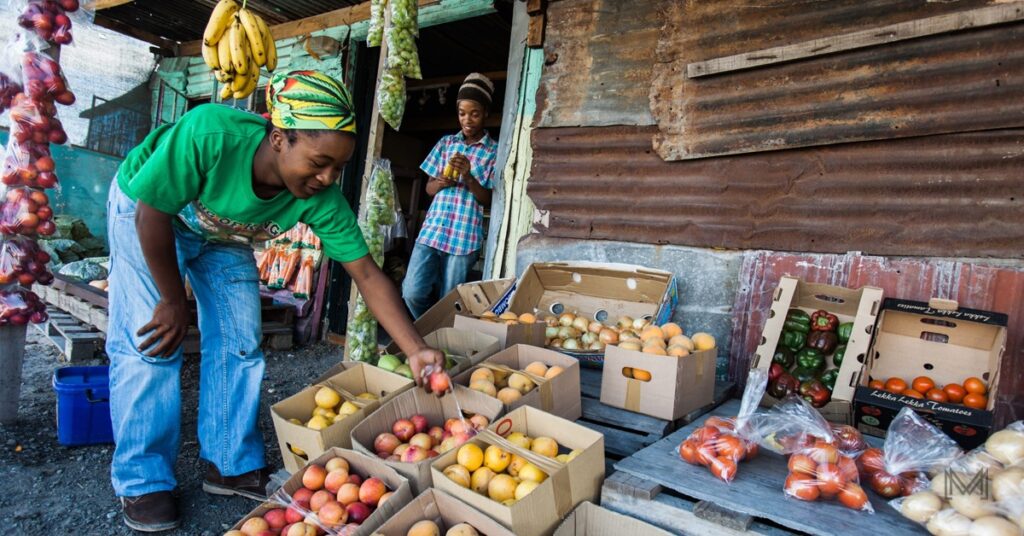How To Run a Spaza Shop Business in South Africa
Spaza shops are the heartbeat of many South African communities. They offer essential goods and services to locals. These shops offer entrepreneurs a chance to build a sustainable livelihood. Run a spaza shop can be rewarding for young or new entrepreneurs. It requires careful planning.
Dedication is essential. Entrepreneurs must have a solid understanding of the business landscape. In this article, we’ll dive into what you need to know about running a spaza shop successfully. We will cover the basics of starting one. Additionally, we will offer tips for long-term success.
What is a spaza shop?
A spaza shop is a small, informal retail store typically found in townships and rural areas across South Africa. These shops sell everyday items like groceries, snacks, toiletries, and household essentials. They are often run from homes, containers, or small rented spaces. They cater to the immediate needs of the local community. Spaza shops play a vital role in providing access to basic goods. This is especially important in areas where formal retail stores are scarce.

A spaza shop is more than just a store; it’s a lifeline for the community and a chance for entrepreneurs to build a better future.
Why Do People Start Spaza Shops?
Many South Africans start spaza shops as a way to generate income and support their families. For some, it’s a response to unemployment, while others see it as an opportunity to be their own boss. The low startup costs and minimal formal requirements make spaza shops an accessible business choice for many. Additionally, spaza shops contribute to the local economy by creating jobs and keeping money within the community.
Do Spaza Shops Need a License?
Yes, spaza shops need a license to run legally. In South Africa, all businesses need a valid business license or authorization. This includes informal ones like spaza shops. This ensures that the business complies with local regulations and health standards, especially if you’re selling food items. To apply for a spaza shop license, you’ll need to visit your local municipality or relevant government office. Some banks, like Nedbank and Standard Bank, also help with the application process.
How to Start a Spaza Shop
Starting a spaza shop is relatively straightforward, but it requires careful planning and preparation. Here’s a step-by-step guide to help you get started:
1. Choose a Location
The location of your spaza shop is crucial to its success. Ideally, you want to set up in a high-traffic area where there’s a demand for your products. Many spaza shops run from homes, especially in rural areas, while others use containers or small rented spaces. If you’re on a tight budget, starting from home is a practical choice.
2. Secure Capital
You’ll need some starting capital to buy your first stock. The amount required depends on the size of your shop and the range of products you plan to sell. Some entrepreneurs start with as little as R1,000, focusing on essential items like bread, milk, snacks, and cold drinks. As your business grows, you can expand your product range.
3. Stock Up on Products
Your choice of products will decide your shop’s appeal. Start with basic items that are in high demand, like groceries, toiletries, and snacks. It’s also a good idea to introduce new products periodically to keep your offerings fresh and exciting. Partner with reliable wholesalers to get competitive prices, as this will allow you to set affordable prices for your customers.

4. Set Up Your Shop
Make sure your spaza shop is clean, organised, and visually appealing. A well-arranged shop attracts customers and makes it easier for them to find what they need. If you’re operating from home, dedicate a specific area to your business to keep professionalism.
5. Obtain Necessary Permits
As mentioned earlier, you’ll need a business license to run legally. Visit your local municipality or bank to apply for the necessary documentation. This step is essential to avoid fines or closure.
10 Tips on How to Run a Spaza Shop Successfully
Running a spaza shop involves more than just selling products. It’s about building relationships with your community. It also involves ensuring your business thrives. Here are 10 tips to help you run a spaza shop effectively:
1. Open Early and Close Late
Spaza shops are known for their convenience, so it’s important to run during hours that suit your customers. Opening early in the morning and closing late in the evening ensures you cater to people’s needs throughout the day.
2. Offer Excellent Customer Service
Treat every customer with respect and kindness. Good customer service encourages repeat business and word-of-mouth referrals, which are essential for growth.
3. Keep Your Products Fresh
Make sure that all your products, especially food items, are fresh and of good quality. No one wants to buy expired or stale goods, and maintaining quality will help you build trust with your customers.
4. Conduct Market Research
Understand your customers’ needs and preferences by conducting market research. This will help you stock the right products and set competitive prices.
5. Introduce New Products Regularly
Keep your shop interesting by introducing new products every month. This not only attracts customers but also gives you an edge over competitors.
6. Maintain a Clean and Attractive Shop
A clean and well-organised shop creates a positive impression and makes shopping a pleasant experience for your customers.
7. Build Relationships with Suppliers
Having reliable suppliers is key to running a successful spaza shop. Build relationships with at least three suppliers to guarantee you always have access to stock.
8. Run Promotions
Occasional promotions or discounts can attract more customers and boost sales. For example, offer a “buy one, get one free” deal on popular items.
9. Manage Your Finances Wisely
Keep track of your income and expenses to guarantee your business remains profitable. Set aside money for restocking and emergencies.
10. Stay Compliant with Regulations
Make sure your spaza shop complies with all legal requirements, including permits and tax registration. This will protect your business from potential issues down the line.
Success in the spaza shop business comes from hard work, dedication, and a deep understanding of your customers’ needs.
Challenges of Running a Spaza Shop
While spaza shops offer many opportunities, they also come with challenges. Some of the common disadvantages include:
- Competition: The spaza shop market is highly competitive, especially in busy areas.
- Stock Shortages: Running out of popular items can lead to lost sales and dissatisfied customers.
- Crime: Spaza shops are often targeted by thieves, so security is a major concern.
- Limited Bargaining Power: Small spaza shops struggle to negotiate discounts with suppliers, affecting their profit margins.
Despite these challenges, many spaza shop owners find ways to overcome them through resilience, innovation, and community support.
How Much Can a Spaza Shop Earn?
The earnings of a spaza shop depend on factors like location, product range, and customer base. On average, a well-run spaza shop in a busy area can earn between R1,500 and R5,000 per day. It’s important to note that these figures vary, and success requires hard work and smart business practices.
Do spaza shops pay taxes?
Yes, spaza shops must register with the South African Revenue Service (SARS) and follow tax regulations. Many informal businesses run under the radar. Registering your spaza shop, you guarantee its legality. Registration also opens up opportunities for growth.
Final Thoughts – Run a Spaza Shop
Running a spaza shop is a possible and rewarding business opportunity for many South Africans. Learn the basics of how to run a spaza shop. Tackle challenges as they arise and implement effective strategies. This approach will allow you to build a successful business that serves your community and supports your livelihood. Whether you’re starting with a small budget or dreaming of expanding your shop, remember that success lies in dedication. Focus on your customers. Continuously improve your business.

FAQs About the Challenges with Somalis Taking Over Spaza Shops
Why is it difficult to run a spaza shop when competing with Somali-owned shops?
Somali-owned spaza shops often run on lower profit margins due to bulk buying and extended working hours. This makes it challenging for others to run a spaza shop profitably. Local entrepreneurs struggle to match their prices and service levels.
How can I run a spaza shop successfully despite competition from Somali entrepreneurs?
To run a spaza shop successfully, focus on building strong community relationships, offering unique products, and providing excellent customer service. Diversifying your offerings and running promotions can also help attract and keep customers.
What strategies do Somali spaza shop owners use that make it hard to run a spaza shop?
Somali entrepreneurs often leverage their networks to access cheaper suppliers. They run longer hours. This can make it harder for others to run a spaza shop competitively. Their ability to offer lower prices and consistent stock availability gives them an edge.
Are there ways to collaborate rather than compete when trying to run a spaza shop?
Yes, local spaza shop owners can explore partnerships with Somali entrepreneurs, like joint buying from suppliers to reduce costs. Learning from their business strategies can also help improve how you run a spaza shop.
What support is available for locals who want to run a spaza shop amid this competition?
Government programs and local business associations sometimes offer training, funding, and mentorship. They aim to help locals run a spaza shop more effectively. These resources can give the tools needed to compete in a challenging market.
For more resources on starting and running a spaza shop, visit Industry Insights. They offer business plans and allow application forms.


